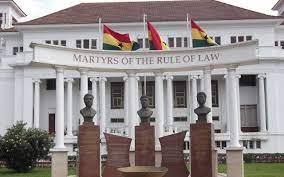The United States Agency for International Development (USAID) has urged Ghanaians to take advantage of the Case Tracking System (CTS), a technology introduced to track criminal cases to contribute to equality in justice delivery in the country.
It is key to addressing issues of missing dockets on criminal cases.
The initiative which was launched in 2018 by Vice President Mahamudu Bawumia to digitally track cases is currently not being patronized by the key justice sector institutions and the citizenry as expected.
Currently, the system has six key Justice Sector Institutions; the Ghana Police Service, Ghana Prisons Service, Legal Aid Commission, Economic and Organized Crime Commission (EOCO), Attorney-General’s Department, and the Judiciary.
The Case Tracking System basically promotes the involvement of civil society organizations in advocacy for justice delivery to help deal with the delay experienced by some suspects especially the vulnerable in resolving their cases.
The CTS is being rolled out in 40 districts in seven regions. The software is presently in 757 centres of which the USAID Justice Sector Support activity is mon Users of the software are able to download, upload and update it with any information on a particular case while the CSOs are only allowed to monitor its usage and progress of cases captured on it.
Esther Ahulu, Public Education and Advocacy Specialist at the Commonwealth Human Rights Initiative (CHRI), while briefing journalists expressed disappointment that three years after the launch of the CTS, the key Justice Sector Institutions such as the police, prisons, and the Attorney-General’s Department have not been using it effectively.
“There are a lot of challenges with the justice system in Ghana. There’s a barrier to access to justice, expensive cost of filing cases and then delay of cases; affordability of lawyers and the fact that people have been on remand for so many years.”
“We need the needed advocacy for people to know the CTS has come to address these key challenges. We need to hold the Justice Sector Institutions accountable,” she elaborated.
While taking journalists through how the CTS functions, Samuel Kombian, Monitoring and Evaluation Specialist with the Legal Resources Commission said the CTS, when working as expected, all the key Justice Sector Institutions would be aware of the progress of a case and be alerted on the platform when a suspect is due for court.
He added that when the person is not being taken to court too, the CTS system will show it at every point in time, the system would be showing the progress of a particular case and this will ensure the right institution is held accountable.
“This system is actually meant to enhance effective collaboration among the key Justice Sector Institutions. It’s also meant to support other efforts like the E-justice and Justice For All programmes.”
“People have been on remand for years and we believe that if this is actually taken up by the Justice Sector Institutions, it will help to give access to remand prisoners for their cases to be heard and the necessary solutions given to them,” Mr. Kombian emphasized.
The USAID and its partners as part of increasing advocacy on the CTS selected journalists from seven regions, including Greater Accra, Ashanti, Volta, Northern and Western, and trained them on case processing with oversight and monitoring responsibilities.

The training of the core group of journalists forms part of USAID’s Justice Sector Support activity being implemented in Ghana. It was organized in collaboration with Legal Resource Center (LRC), (CHRI), and the Crime Check Foundation (CCF) on July 23, 2021, in Accra.
Meanwhile, a retired broadcaster and Lecturer at Wisconsin University, Teye Kitcher reminded the journalists about the core ethics of their profession as they contribute to the effectiveness of the CTS across the beneficiary regions.
















































